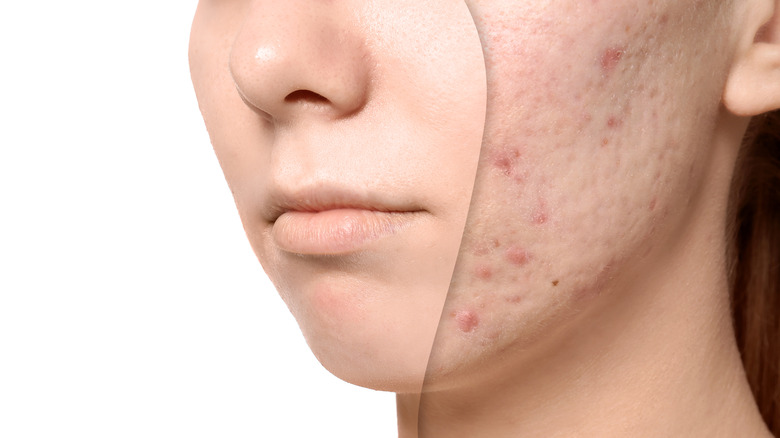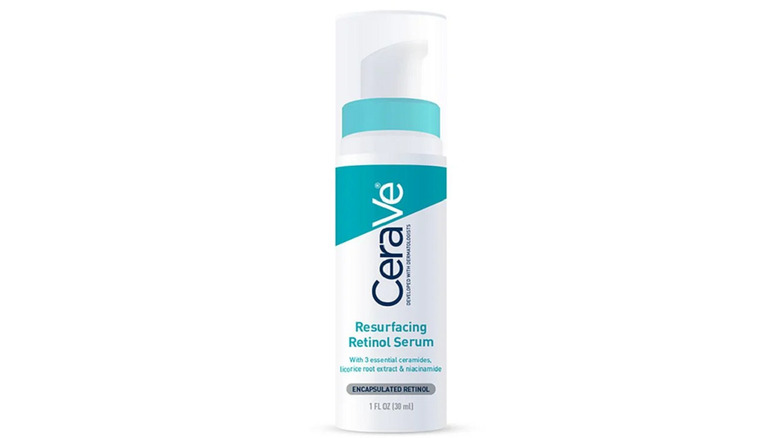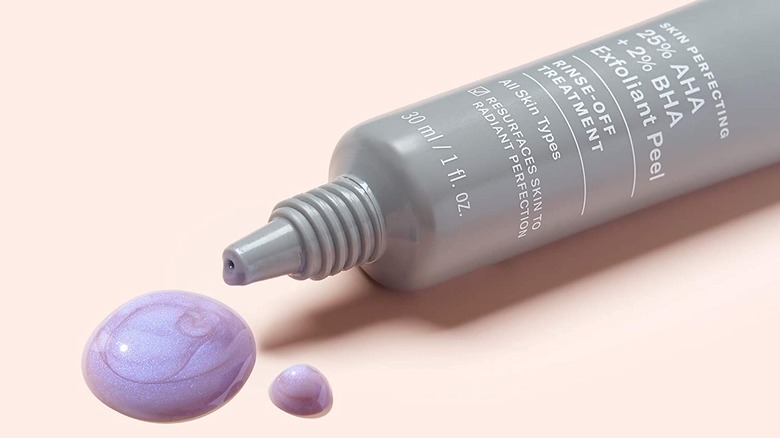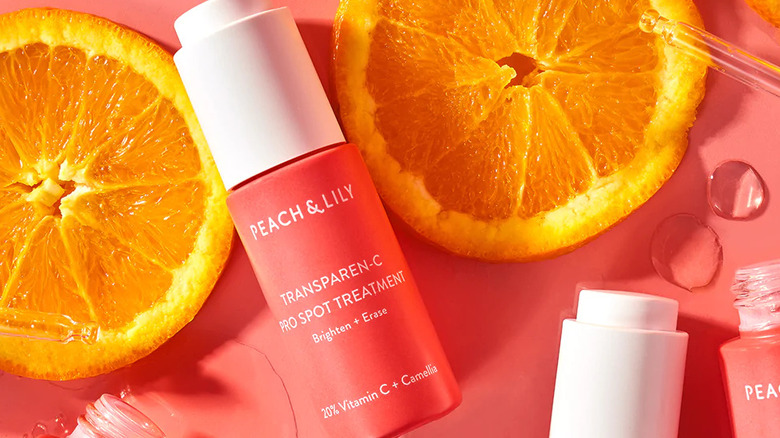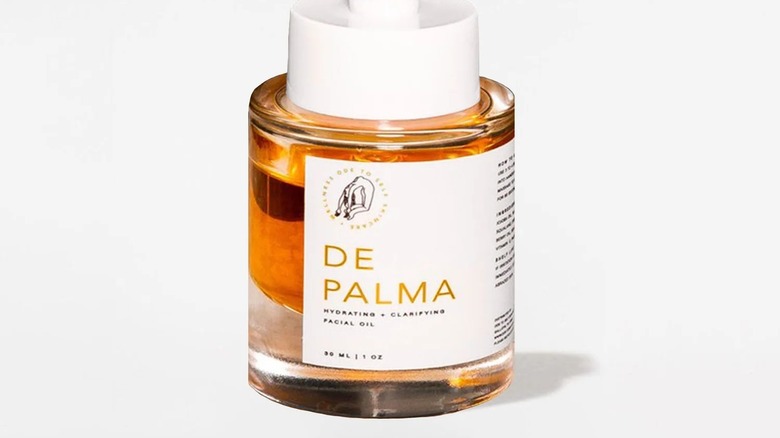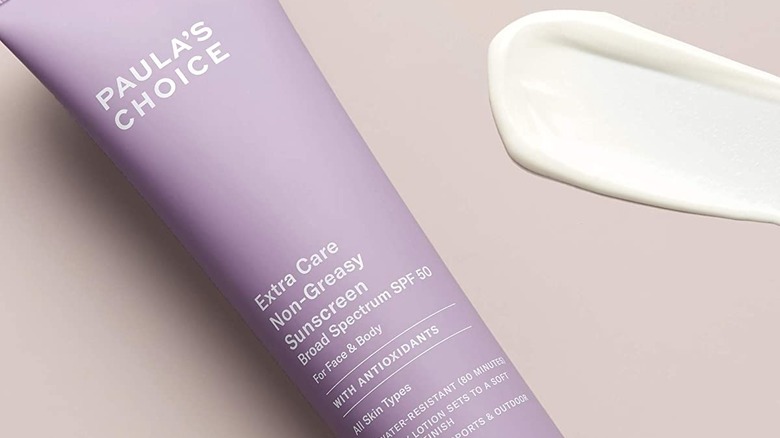Skincare Ingredients That Can Treat Stubborn Acne Scars
We may receive a commission on purchases made from links.
Acne is a frustration that many have to deal with, and some become even more frustrated by the scars it can leave. The three most common acne scars are hypertrophic (or keloid), hyperpigmentation, and atrophic scars (per Healthline). Atrophic scars are indented or depressed scars that affect the skin's texture, and they are what most people think of when they hear the words "acne scarring". They come in three types, and they are caused by collagen loss due to acne. Ice pick atrophic scars narrow as they deepen and often appear on the upper cheeks and forehead. Rolling atrophic scars are usually found on the lower parts of your cheek and make the skin look uneven and wavy. Finally, boxcar atrophic scars are deeply indented and commonly found on the lower cheeks and jawline (via Art of Dermatology).
Conversely, hypertrophic and keloid scars are deeper scars caused by excessive collagen growth. This often happens when your body makes too much collagen to repair your skin after acne subsides. Hyperpigmentation scars are the last type and are most common in people of color. They are formed when the skin produces too much melanin to replace damaged skin after acne.
If your acne scarring is hypertrophic or keloid, the Acne Support Organization recommends visiting a licensed skin therapist or esthetician for professional-grade treatments, because you cannot completely treat these scars with energy-free techniques. However, if you have atrophic acne scars and dark spots caused by hyperpigmentation, several skincare ingredients can treat them effectively.
Vitamin A (Retinol)
If you're battling acne scars, you want to get really friendly with Vitamin A in various forms, including retinol and retinoids. Retinol stimulates cell turnover, which can help fade hyperpigmentation scars. It is a powerful antiaging ingredient and can help combat wrinkles and fine lines.
However, if your scars are atrophic, products with retinoids are a better choice for you. Retinoids are stronger than retinol and effectively free our pores up, which prevents acne. They also prevent and fade hyperpigmentation and atrophic acne scars. Two of the most effective forms of retinoids are tretinoin and adapalene gels, according to a 2017 study published in the Journal of Dermatology and Therapy. The study found that daily usage of these topical retinoids can effectively reduce scarring and post-acne inflammation after about 24 weeks.
Retinoids are an excellent way to treat acne scarring, but they must be used carefully. Since they increase cell turnover, they can be drying to sensitive and dry skin types. So, if you want to safely use retinoids, gently incorporate it into your routine by patch-testing it and using it in mild concentrations. You can even invest in a moisturizing hyaluronic acid serum to balance things out. There are plenty of options out there, but one of the best acne scar treatment retinols to add to your list is CeraVe's Resurfacing Retinol Serum. It contains retinol, niacinamide, and other skincare ingredients that treat stubborn acne scars.
Exfoliating acids
Exfoliating acids treat acne scars by loosening up dead skin, encouraging cell turnover, and stimulating collagen production. You may be familiar with salicylic, glycolic, and lactic acids, which have been proven effective by multiple studies.
In 2009, a study published in the Journal of Dermatologic Surgery investigated the efficacy of glycolic versus salicylic mixed with mandelic acid peels for acne scars. The results show that the salicylic and mandelic mix began to work faster than glycolic acid. However, both groups had similar results by 24 weeks. Icepick scars were reduced by at least 10%, boxcar scars faded by at least 20%, and post-inflammatory hyperpigmentation scars by 46%. It's important to note that about 17% of the patients reported a stinging sensation and dryness. Consequently, salicylic and glycolic acids are best for oily non-sensitive skin because they reduce oil production.
If you have dry skin, lactic acid will suit you because it moisturizes as it exfoliates. A 2017 study published in the Scars, Burns, and Healing Journal shows that a 92% lactic acid peel can reduce acne scars by more than 75%. Of course, lactic isn't as effective as the harsher acids, but it is a fantastic way to treat acne scars without drying the skin. Surprisingly, both studies found exfoliating acids to be more effective when mixed. So, if you're considering an acid peel, we love Paula's Choice 25% AHA + 2% BHA Exfoliant Peel. It contains glycolic, lactic, and mandelic acids, making it mild but effective.
Vitamin C
Vitamin C is a key and versatile ingredient that can help treat various stages of acne. A 2018 study published in the Sohag Medical Journal found the combination of daily Vitamin C usage and six professional micro-needling sessions to be widely effective in treating atrophic acne scars. The patients used Vitamin C daily and during the micro-needling sessions, which were four weeks apart. This procedure is "relatively risk-free" when done by a professional.
However, if you're trying to treat scars on a budget, consider pairing an effective Vitamin C serum with a derma-roller. Derma-rollers are less effective than the real thing, so you'll need some research beforehand to maximize your derma-rolling benefits. If you don't want to use a derma-roller, a 2017 study published in the Nutrients Journal showed that topical application prevents the formation of keloids and enhances collagen production.
Vitamin C also treats acne-related inflammation, per a 2017 study published in the Nutrients Journal. Its anti-inflammatory and numerous other benefits make it a must-have in your routine. If you have sensitive skin or active acne, you should choose a Vitamin C serum with a low concentration. Remember to patch test and then gently introduce it into your routine. The Peach & Lily Transparen-C Pro Spot Treatment is a fantastic option, it contains 20% Vitamin C and many oils that help fade dark spots.
Rosehip oil
Rosehip oil is an essential oil loaded with linoleic and other fatty acids that help the skin retain moisture. Linoleic acid, in particular, has been proven to treat acne at various stages. For example, a 1986 study published in the Journal of the American Academy of Dermatology showed a link between linoleic deficiency and active acne. What's more, this acid also has pigment-lightening properties that can help lighten hyperpigmentation scars.
Another reason to use rosehip oil, apart from the fact that is a must-have in Dorinda Medley's Simple Skincare Routine, is that it stimulates the production of collagen, which helps the skin rebuild itself. Rosehip oil is also loaded with anti-inflammatory properties that can relieve discomfort from acne. Its pigment-lightening powers also help protect your skin from the sun, one of the most significant causes of hyperpigmentation (via Healthline).
Rosehip oil is an essential oil, so you only need a few drops for your entire face. After using your water-based products, massage three to five drops of rosehip into your skin. As a bonus, it's non-comedogenic, so it won't clog up your pores. Our fave recommendation is the super budget-friendly 100% Organic Cold-Pressed Rose Hip Seed Regenerative Oil from The Ordinary.
Sunscreen
Many acne scars never go away no matter how hard you try, and some require prescription medication. Considering this, the best thing you can do for your acne scars is to prevent any more from developing by using sunscreen. Hyperpigmentation scars, in particular, can be prevented by shielding your skin from the sun. Sun exposure often causes damage, leading to excessive melanin production. So, by protecting your skin from the sun, you can prevent your acne scars from becoming hyperpigmented, which makes them harder to heal.
Sunscreen can even treat acne scars. The American Academy of Dermatology Association states that sunscreen can help reduce discoloration, and consistent use can even help scars fade faster. Ideally you should look for a sunscreen with moderate to high SPF levels, and look for products that include acne or scar treatment ingredients. If you're looking for an acne scar removal sunscreen, shop Paula's Choice Extra Care Non-Greasy Sunscreen SPF 50. It contains Vitamins A and C, which are great for active acne and scars.
One final tip to remember is that makeup or skincare products containing SPF do not make up for sunscreen. They don't offer enough protection against the sun. You can use them, but ensure that you also use sunscreen to fully protect your skin and prevent more acne scars.
